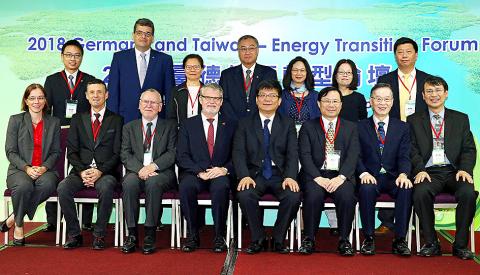With only four days left before the registration deadline for this year’s World Health Assembly (WHA), the government and some members of the international community have endeavored to give the nation’s bid a final boost.
In a letter written on Tuesday, Independent Canadian Senator Stephen Greene called on Canadian Minister of Foreign Affairs Chrystia Freeland to support Taiwan’s inclusion in the WHA to be held from May 21 to May 26 in Geneva, Switzerland, on behalf of the Canadian government.
“Canada and Taiwan share strong economic and cultural links, and more importantly to the issue at hand, our two countries worked very closely together in managing the SARS outbreak of 2003,” Greene wrote.

Photo: CNA
Given the devastating effect SARS had on Canada, particularly Toronto, which Freeland represents in the Canadian House of Commons, it is “unimaginable to exclude any willing partner from participating in the WHA,” Greene said.
The letter was also sent to Canadian Minister of Health Ginette Petitpas Taylor, WHO director-general Tedros Adhanom Ghebreyesus, WHO executive board chair Assad Hafeez and WHO executive board vice chair Sarah Lawley.
Meanwhile, German Institute Taipei Director-General Martin Eberts yesterday also threw his support behind Taiwan’s bid to participate in international events.
Speaking on behalf of the institute and the German government while attending an energy transition forum in Taipei, Eberts said he hoped that Taiwan would not suffer international isolation due to bullying, saying that Berlin supported Taiwan and its people being part of international affairs.
Taiwan first participated in the WHA as an observer in 2009, one year after then-president Ma Ying-jeou (馬英九) took office and his administration pursued a more conciliatory policy toward China.
The nation was invited to the annual meeting as an observer until last year, when it failed to receive an invitation due to Chinese pressure.
The last invitation was received only days before President Tsai Ing-wen (蔡英文) took office on May 20, 2016, and came with an unprecedented mention of Beijing’s “one China” principle.
Despite having admitted that the chances of Taiwan receiving a WHA invitation this year are slim, the government has explored all possible ways to increase international support for its bid, including resorting to international media and launching online propaganda campaigns to underline Taiwan’s dedication to public health.
The latest effort was by Minister of Health and Welfare Chen Shih-chung (陳時中), who wrote an opinion piece calling for international support for the nation’s WHA bid that was published on Wednesday in online international magazine The Diplomat.
Chen urged the WHO and related parties to acknowledge Taiwan’s long-standing contributions to promoting health worldwide, and recognize the significance and legitimacy of Taiwan’s involvement as an observer in this year’s WHA.
“Because we believe that to achieve health for all, Taiwan can help,” Chen wrote.

AGING: As of last month, people aged 65 or older accounted for 20.06 percent of the total population and the number of couples who got married fell by 18,685 from 2024 Taiwan has surpassed South Korea as the country least willing to have children, with an annual crude birthrate of 4.62 per 1,000 people, Ministry of the Interior data showed yesterday. The nation was previously ranked the second-lowest country in terms of total fertility rate, or the average number of children a woman has in her lifetime. However, South Korea’s fertility rate began to recover from 2023, with total fertility rate rising from 0.72 and estimated to reach 0.82 to 0.85 by last year, and the crude birthrate projected at 6.7 per 1,000 people. Japan’s crude birthrate was projected to fall below six,

Conflict with Taiwan could leave China with “massive economic disruption, catastrophic military losses, significant social unrest, and devastating sanctions,” a US think tank said in a report released on Monday. The German Marshall Fund released a report titled If China Attacks Taiwan: The Consequences for China of “Minor Conflict” and “Major War” Scenarios. The report details the “massive” economic, military, social and international costs to China in the event of a minor conflict or major war with Taiwan, estimating that the Chinese People’s Liberation Army (PLA) could sustain losses of more than half of its active-duty ground forces, including 100,000 troops. Understanding Chinese

US President Donald Trump in an interview with the New York Times published on Thursday said that “it’s up to” Chinese President Xi Jinping (習近平) what China does on Taiwan, but that he would be “very unhappy” with a change in the “status quo.” “He [Xi] considers it to be a part of China, and that’s up to him what he’s going to be doing, but I’ve expressed to him that I would be very unhappy if he did that, and I don’t think he’ll do that. I hope he doesn’t do that,” Trump said. Trump made the comments in the context

SELF-DEFENSE: Tokyo has accelerated its spending goal and its defense minister said the nation needs to discuss whether it should develop nuclear-powered submarines China is ramping up objections to what it sees as Japan’s desire to acquire nuclear weapons, despite Tokyo’s longstanding renunciation of such arms, deepening another fissure in the two neighbors’ increasingly tense ties. In what appears to be a concerted effort, China’s foreign and defense ministries issued statements on Thursday condemning alleged remilitarism efforts by Tokyo. The remarks came as two of the country’s top think tanks jointly issued a 29-page report framing actions by “right-wing forces” in Japan as posing a “serious threat” to world peace. While that report did not define “right-wing forces,” the Chinese Ministry of Foreign Affairs was